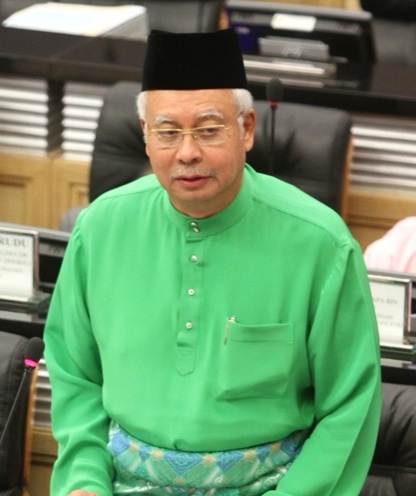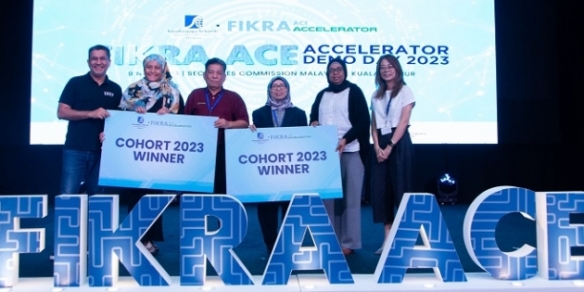Malaysia’s racial policy rears its head in ICT sector
By A. Asohan December 3, 2012
- A clear example of the road to hell being paved with good intentions?
- National initiative to help bumiputera technopreneurs in danger of being hijacked
 A NEW initiative to upgrade Malay or bumiputera entrepreneurs in the information and communications technology (ICT) sector is in danger of being hijacked by Malaysia’s race-based preference policies.
A NEW initiative to upgrade Malay or bumiputera entrepreneurs in the information and communications technology (ICT) sector is in danger of being hijacked by Malaysia’s race-based preference policies.
On Nov 7, Malaysian Prime Minister Datuk Seri Najib Tun Razak (pic) announced the PUsh (Pemangkin Usahawan or Entrepreneur Catalyst) initiative to “prop up” the performance of bumiputera entrepreneurs in the ICT and Creative sectors, with the aim of creating “three giant global companies by 2015,” English daily The Star reported.
PUsh was set up by the New Entrepreneurs Foundation (MyNEF) in collaboration with the Malaysian Association of Bumiputera ICT Industry and Entrepreneurs (NEF) and in cooperation with various government agencies, including the Multimedia Development Corporation (MDeC), Bumiputera Agenda Steering Unit (Teraju), Malaysia Venture Capital Management Bhd (Mavcap), Malaysia Innovation Agency (AIM) and the Malaysia Communications and Multimedia Commission (MCMC).
“Our main aim is to merge selected bumiputera entrepreneurs into three major giant ICT and creative bumiputera companies that are successful and globally competitive,” Najib was reported as saying by The Star.
The initiative will kick off with 14 training programs, the Prime Minister said, with RM50 million (US$16.4 million) having been allocated as an initial fund, while Mavcap would set aside RM30 million (US$9.8 million) for the merger of small and medium-sized ICT and creative companies.
The initiative was the result of a dialogue session between bumiputera technopreneurs and Najib on June 21, to “discuss current issues and challenges” experienced by the community.
In Malaysia, many public sector projects and procurements give preference to companies owned by bumiputeras – largely Malay-Muslims who make up 60% of the country's population – under the New Economic Policy launched in 1971 to upgrade the economic well-being of the Malay race, who at the time had a very small share of the economic pie.
Critics however say the NEP has been abused by politicians and those with connections to them, and is nothing more than a rent-seeking exercise that has failed to improve the lot of poorer Malays.
In the early days of his premiership, Najib announced that Malaysia would have to dismantle many of these preferential policies for the nation to remain competitive, but he had to backtrack after pressure from right-wing Malay groups.
Not about quotas

MyNEF is a not-for-profit organization established by industry players in partnership with the Malaysian Government. Its chairman Ashran Ghazi (pic), in an interview with Digital News Asia (DNA) the week after Najib’s PUsh announcement, strongly denied that the initiative would introduce a new layer of NEP-style policies that would affect the ICT sector.
“I am against preference policies and it’s not about filling racial quotas,” he said. “I want to keep away from that, because they minute you go into that, you’re in a trap.”
“Preference policies will not work in the ICT sector – it’s just too competitive. It’s never worked before, and it won’t now. Government bodies and government-linked companies (GLCs) will not buy an inferior system from a vendor just because it’s a bumiputera company. IT is just too critical to their operations for that to work.”
“PUsh is about upgrading the quality of bumiputera technopreneurs and businesses so that they would be able to compete better,” he added.
However, a source DNA spoke to say that meetings between bumiputera technopreneurs began in the first quarter of this year, and despite MyNEF’s emphasis on training and other programs, many had in fact asked for procurement preference policies.
‘Within these four walls’
One bumiputera businessman who requested anonymity told DNA that he attended the initial meeting, which included representatives from government and quasi-government agencies.
“It was stressed very strongly that whatever was discussed at this meeting would have to remain within these four walls,” he said, although he added that some of the government representatives as well as MyNEF’s Ashran tried to steer the discussion away from racial quotas and preference policies.
“However, despite this, many of the technopreneurs were demanding a ‘fair share’ of projects, especially projects under the ETP,” he said, referring to the Najib administration’s Economic Transformation Program and its Entry Point Projects.
MyNEF’s Ashran acknowledged that there were some quarters trying to push for this, but was confident that they would not have their way. He also said that the Prime Minister’s speech to announce PUsh “may have lost something in the translation.”
“MyNEF’s idea is not about creating three giant global ICT companies – you don’t become global just by merging into a big company,” he admitted.
“Our focus is on encouraging mergers and acquisitions (M&As) between mid-tier companies with the rights kinds of synergy so that they can become one, larger company that can compete fairly but more effectively,” he said.
Good intentions
Ashran said the plight of bumiputera technopreneurs in the country was brought into stark relief after a national directory MyNEF compiled in 2010.
“When we dissected the statistics, we found that 45% of the bumiputera ICT companies we surveyed were earning less than RM200,000 (US$65,590) per year,” he said, acknowledging however that MyNEF did not have comparative statistics on non-bumiputera ICT companies.
He said there were many issues facing these companies.
“Most of them are systems integrators; and many are happy operating within the geographic locations they were situated in, a signification proportion of which was in rural areas,” he said. “If so, PUsh will help them add value to how they serve their communities.”
Ashran said MyNEF would also be looking at “some kind of distribution model” so that these companies can expand their services beyond their geographical boundaries while remaining where they were, pointing to the many cloud computing initiatives in the country as possible platforms.
Another aspect is education and training. “To be fair, many have a limited vision when it comes to the potential of their products,” he said.
“We have succeeded in bringing some smaller companies to pitch at large customers or potential partners, but when they fail in this pitch, they don’t know how to go back to the drawing board to re-position or re-package their products,” he added. “Some bumiputera technopreneurs also have poor communications skills.”
Thus the training programs, although Ashran was quick to stress that PUsh would not duplicate what was already out there. “We will work together with other entrepreneur training providers and even bodies like MDeC so that we can fill any gaps, but we won’t do what they are already doing.
“In fact, we will encourage bumiputera technopreneurs to participate in these other programs.”
He acknowledged that many entrepreneurs are reluctant to participate in training programs because it takes them away from running their business.
“We have to show them that there is value in taking part, and that it is going to help them earn more,” he added. “Indeed, if we are successful, even though my charter covers bumiputera companies only, I don’t see why we can’t involve all entrepreneurs in the future.”
M&As
As for creating “three giant global ICT companies,” Ashran said that this was a miscommunication. “What we want to do is create three companies, through M&As, large enough to compete in overseas markets.”
He said the idea came after he had worked with four small companies in the animation industry. “I felt that they had tremendous synergy, and suggested that they should think about merging into one big company.”
However, the four companies had no idea how to go about doing this.
“This is where MyNEF can come in – we can act as outside, independent consultants to determine the valuation of these companies and the equity make-up, and even guide them through the process,” he said.
“Once we have a successful model, we can replicate it for other companies looking to merge with each other,” he added.
Finally, Ashran stressed again that PUsh was not about preferential treatment or filling racial quotas. In fact, he said its intentions were quite the opposite.
“We want to create competitive bumiputera companies so that they don’t go around asking the Government, ‘Please help us; give us contracts’,” he said. “I don’t want that to ever happen.”


